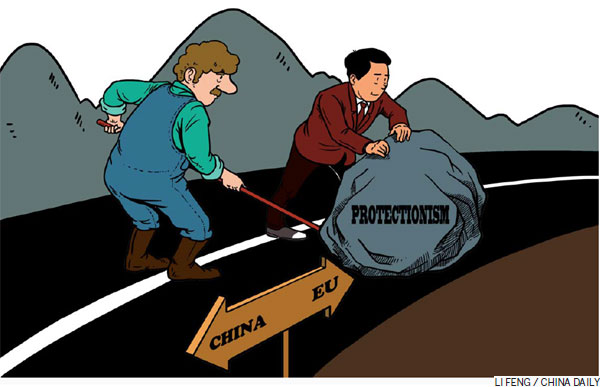Beyond a bilateral negotiation
Updated: 2016-02-26 08:57
By Yang Yanyi(China Daily Europe)
|
|||||||||
The real issue is about EU's standing by its commitment to fair trade, multilateralism and international rules
The protectionist sentiment and confrontational approach that have emerged in the European Union are worrying, as well as being regrettable and misleading.
The European Commission has opened new anti-dumping investigations on steel from China, and the European steel industry organized a demonstration against so-called Chinese dumping in the EU market and the granting of market economy status to China.

Overcapacity, including excess capacity in the global steel sector, is one of the many challenges we are all faced with. Not only the European steel industry has been hard hit, iron and steel industries in many emerging economies are suffering badly. Some estimates say cutting back overcapacity in China by 30 percent in industries with most excess capacity - iron and steel, coal, cement, shipbuilding, aluminum and flat glass - would affect 3 million workers.
The situation is serious and requires a response.
But what kind? Grumble, curse, cut the ground from under others' feet? Retreat into protectionism and be at each other's throats?
If history serves as a guide, these are unwelcome if not irresponsible responses. They may help to give vent to the anger and frustration of some and obtain short-term gains, but they fail to serve common long-term interests of all.
Obviously, the response is up to each country. I only wish to share what we believe to be the best possible approach and option, and what China has been doing and will continue to do.
First, digest the problem and not dump it onto others' doorsteps.

The development of the steel industry in China has been mainly to meet its domestic demand.
China has taken tough measures to control new capacity. China has cut its steel industry capacity by more than 90 million tons over the past few years and its investment in iron and steel assets by 13 percent last year. The growth of Chinese steel production has basically come to a halt. China has made the elimination of overcapacity the top priority for this year and will cut the steel industry capacity by another 100 to 150 million tons.
Second, take the tackling of overcapacity as an opportunity to accelerate economic restructuring.
China is pushing through essential reforms and restructuring. Aware that much of China's industrial overcapacity is heavily concentrated at the lower end of the value curve, we have taken restructuring as an important part of the difficult transition of moving China away from an investment-led economy to a consumer-oriented one.
China is restructuring the steel sector by eliminating outmoded capacity, creating exit strategies for "zombie companies" based on market rules, and encouraging promotion of innovation, technology, quality and management to meet production safety, energy consumption and environmental protection standards, and ensure the effective supply of high-quality products.
Third, support the training and relocation of workers for new jobs to minimize negative effects. The Chinese government has taken measures to help redundant labor change career paths. And with rebalancing underway and with numerous new industries emerging, it is far easier now to get new and better-paid jobs than it was in the late 1990s when inefficient state-owned industries were reformed.
This should also mean China can rely more on domestic consumption, instead of pouring yet more concrete in a country that has already built too many steel mills and cement plants.
Fourth, stay the course of transformation.
The many vicissitudes we have gone through have taught us that maintaining the status quo and protecting underperforming sectors are only temporary adaptations to circumstances rather than a long-term solution.
To be competitive we have to live with the world as it is, and when the world changes we must be nimble and seize the opportunities that come with challenging circumstances and swiftly adjust in a pragmatic and clinical manner.
Yet to achieve high-quality, efficient and sustainable growth is not an impossible dream. We are determined to endure the hardships and have the strength, determination and willingness to see its realization.
Fifth, China remains committed to opening-up to achieve international competitiveness and promote win-win cooperation.
In our globalized world, we are interdependent. This is not an option but a reality. Our progress and achievement has also resulted in growing for our global partners, especially our strategic partners.
Given this, we are working closely with our neighbors and the neighbors of our neighbors to establish the Silk Road Economic Belt and 21st Century Maritime Silk Road, which will forge closer economic ties, deepen cooperation and expand development in the Eurasian region.
We are also expanding opportunities for both China and the EU by increasing market access and leveling the competitive playing field, including through negotiations on, and early conclusion of, the China-EU Investment Agreement.
We are advancing economic reforms and restructuring that will create a more rapidly growing Chinese market for EU goods and services by moving China toward more home-grown, consumption-led growth.
Last but not least, global excess steel capacity calls for global action.
All the countries concerned should step up dialogue and exchanges to seek to resolve their concerns through closer cooperation rather than resorting to trade defense measures, which are not sound remedies.
China stands ready to engage in dialogue and consultation with the EU through platforms including the China-EU Steel Dialogue to resolve their differences and properly manage trade friction.
I wish to mention a conversation I had some weeks ago with a European business leader in the steel industry. He didn't pick a fight with me. Rather, he was very friendly, frank and open-minded. Of the many interesting points he shared with me, three are especially impressive.
One, China represents more of an opportunity than a challenge. For many years, Western policymakers and scholars, as well as media pundits and commentators, including those in the EU, have engaged in heated debates on whether the rise of China represents a threat or an opportunity.
For the EU, China is both a challenge and an opportunity. But in the final analysis, China represents more of an opportunity. China's moving from a major exporter of low-value-added manufactured goods toward higher-end production and domestic consumption augurs well for the EU.
And it is very important the EU keep in mind there is only one China in the world, it should not miss the opportunities that a transforming China offers.
Two, the EU and China can and should work with each other and not against each other. The EU and China are neither strategic competitors nor rivals. In areas where they diverge, both have the wisdom and capability to accommodate and work things out in a mutually beneficial manner. The successful settlement of the solar panel dispute was a case in point.
Three, it is imperative that the EU hold on to its values of openness and inclusiveness. While the concerns and worries of the steel sector can be well appreciated, it is necessary to remind ourselves that to keep the EU's social model and give concrete hope to EU citizens, especially the younger generation, EU countries must reform and change. The same is true for the steel industry. Even if China were not competing in the steel market, there are other competitors with a competitive edge.
Although voices saying this are rarely heard in the media, they are worth listening to and heeding when they are.
Whether or not it recognizes China's market economy status, the EU and all other members of the World Trade Organization are under the obligation to apply the rules of the WTO, namely Section 15 of the Protocol on the Accession of China to the WTO, which says members should stop using the "analog country method" in anti-dumping investigations against China as of Dec 11, 2016.
It should be clarified; this is not a bilateral negotiation between China and the EU. This is not about whether or not China is up to the market economy criteria of the EU. This is simply irrelevant. The real issue is about the EU's standing by its values of, and commitment to, fair trade, multilateralism and rules-based international order.
We look forward to the EU's clear-cut compliance with its WTO obligations and application of equal terms to China in its calculations of anti-dumping duties.
The author is head of the Chinese Mission to the European Union.
Today's Top News
Inspectors to cover all of military
Britons embrace 'Super Thursday' elections
Campaign spreads Chinese cooking in the UK
Trump to aim all guns at Hillary Clinton
Labour set to take London after bitter campaign
Labour candidate favourite for London mayor
Fossil footprints bring dinosaurs to life
Buffett optimistic on China's economic transition
Hot Topics
Lunar probe , China growth forecasts, Emission rules get tougher, China seen through 'colored lens', International board,
Editor's Picks

|

|

|

|

|

|







